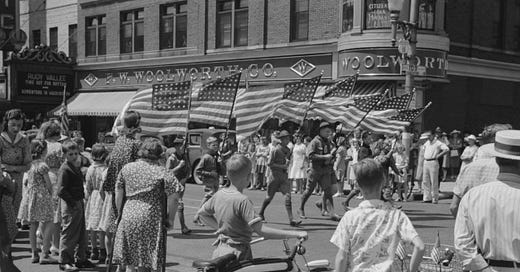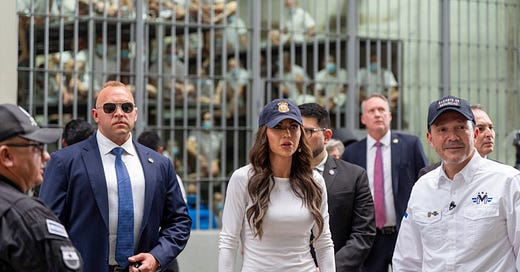What It Takes to Protect the “Fundamentals of 1776”
FDR on the war and the fight for democracy.

[President Roosevelt delivered this brief radio address from his home in Hyde Park, New York on July 4, 1941—six months after his historic third inauguration, four months after the enactment of the Lend-Lease Act permitting the United States to send desperately needed materiel to the nations fighting the Nazis, and five months before the attack on Pearl Harbor. In this address, as in many of the speeches FDR gave in 1941, he sought to depict the war in Europe as a fight for democracy itself. Thanks to the FDR Presidential Library and Museum, you can see his notes and manuscript and can listen to an audio recording.]
My fellow Americans:
In 1776, on the fourth day of July, the representatives of the several states in Congress assembled, declaring our independence, asserted that a decent respect for the opinion of mankind required that they should declare the reasons for their action. In this new crisis, we have a like duty.
In 1776 we waged war in behalf of the great principle that government should derive its just powers from the consent of the governed—in other words, representation chosen in free elections. In the century and a half that followed, this cause of human freedom swept across the world.
But now, in our generation—in the past few years—a new resistance, in the form of several new practices of tyranny, has been making such headway that the fundamentals of 1776 are being struck down abroad, and definitely they are threatened here.
It is, indeed, a fallacy, based on no logic at all, for any Americans to suggest that the rule of force can defeat human freedom in all the other parts of the world and permit it to survive in the United States alone. But it has been that childlike fantasy itself—that misdirected faith—which has led nation after nation to go about their peaceful tasks, relying on the thought, and even the promise, that they and their lives and their government would be allowed to live when the juggernaut of force came their way.
It is simple—I could almost say simpleminded—for us Americans to wave the flag, to reassert our belief in the cause of freedom, and to let it go at that.
Yet, all of us who lie awake at night—all of us who study and study again—know full well that in these days we cannot save freedom with pitchforks and muskets alone, after a dictator combination has gained control of the rest of the world.
We know that we cannot save freedom in our own midst, in our own land if all around us—our neighbor nations—have lost their freedom.
That is why we are engaged in a serious, in a mighty, in a unified action in the cause of the defense of the hemisphere and the freedom of the seas. We need not the loyalty and unity alone; we need speed and efficiency and toil and an end to backbiting, an end to the sabotage that runs far deeper than the blowing up of munitions plants.
I tell the American people solemnly that the United States will never survive as a happy and fertile oasis of liberty surrounded by a cruel desert of dictatorship.
And so it is that when we repeat the great pledge to our country and to our flag, it must be our deep conviction that we pledge as well our work, our will, and, if it be necessary, our very lives.














